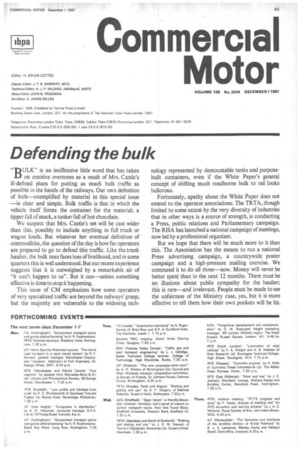Defending the bulk
Page 51

If you've noticed an error in this article please click here to report it so we can fix it.
ULK" is an inoffensive little word that has taken
LI on emotive overtones as a result of Mrs. Castle's ill-defined plans for putting as much bulk traffic as possible in the hands of the railways. Our own definition of bulk—exemplified by material in this special issue —is clear and simple. Bulk traffic is that in which the vehicle itself forms the container for the material; a tipper full of muck, a tanker full of hot chocolate.
We suspect that Mrs. Castle's net will be cast wider than this, possibly to include anything in full truck or wagon loads. But whatever her eventual definition of commodities, the question of the day is how far operators are prepared to go to defend this traffic. Like the trunk haulier, the bulk man faces loss of livelihood, and in some quarters this is well understood. But our recent experience suggests that it is outweighed by a remarkable air of "it can't happen to us". But it can—unless something effective is done to stop it happening.
This issue of CM emphasizes how some operators of very specialized traffic are beyond the railways' grasp, but the majority are vulnerable to the widening tech
nology represented by demountable tanks and purposebuilt containers, even if the White Paper's general concept of shifting much roadborne bulk to rail looks ludicrous.
Fortunately, apathy about the White Paper does not extend to the operator associations. The TRTA, though limited to some extent by the very diversity of industries that in other ways is a source of strength, is conducting a Press, public relations and Parliamentary campaign. The RHA has launched a national campaign of meetings, now led by a professional organizer.
But we hope that there will be much more to it than this. The Association has the means to run a national Press advertising campaign, a countrywide poster campaign and a high-pressure mailing exercise. We commend it to do all three—now. Money will never be better spent than, in the next 12 months. There must be no illusions about public sympathy for the haulier; this is rare—and irrelevant. People must be made to see the unfairness of the Ministry case, yes, but it is more effective to tell them how their own pockets will be hit.




























































































































































































